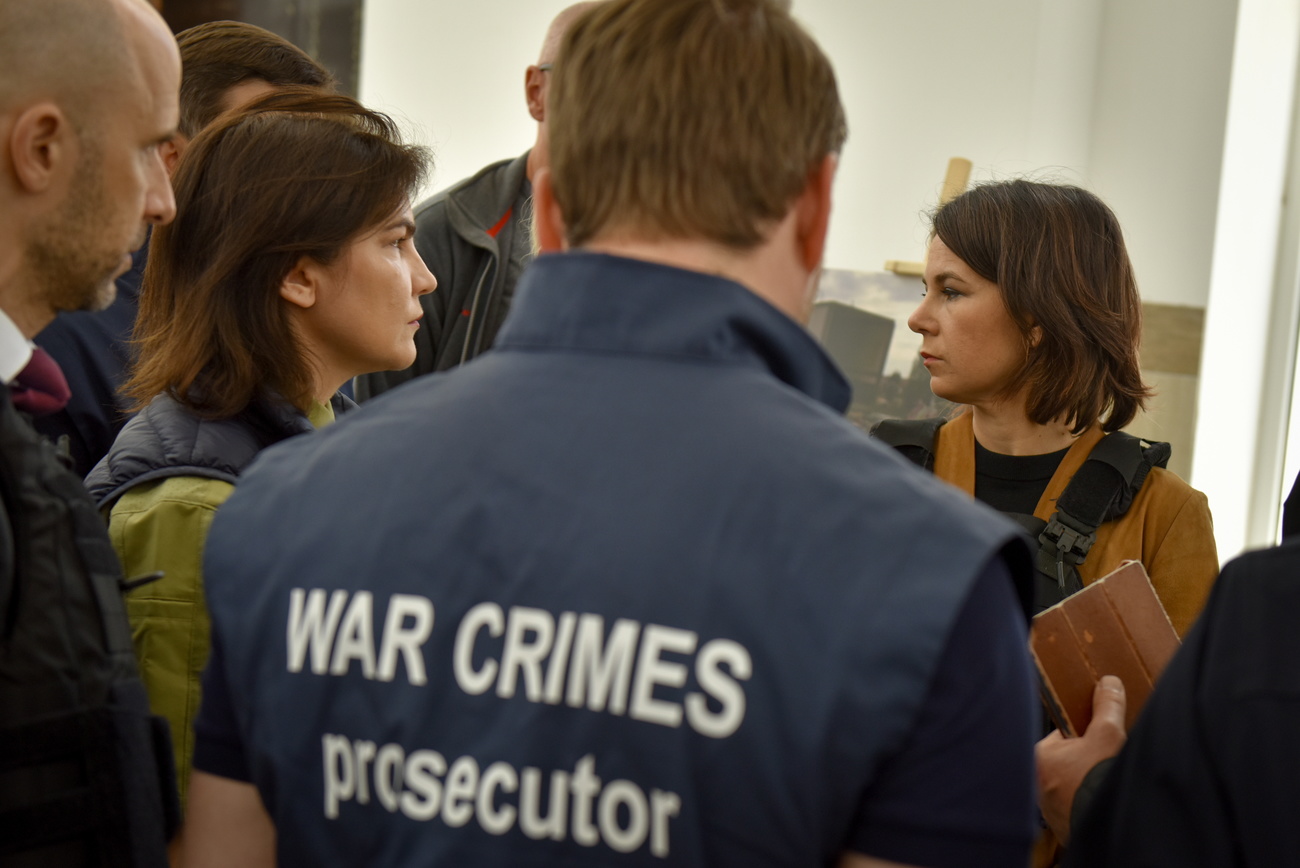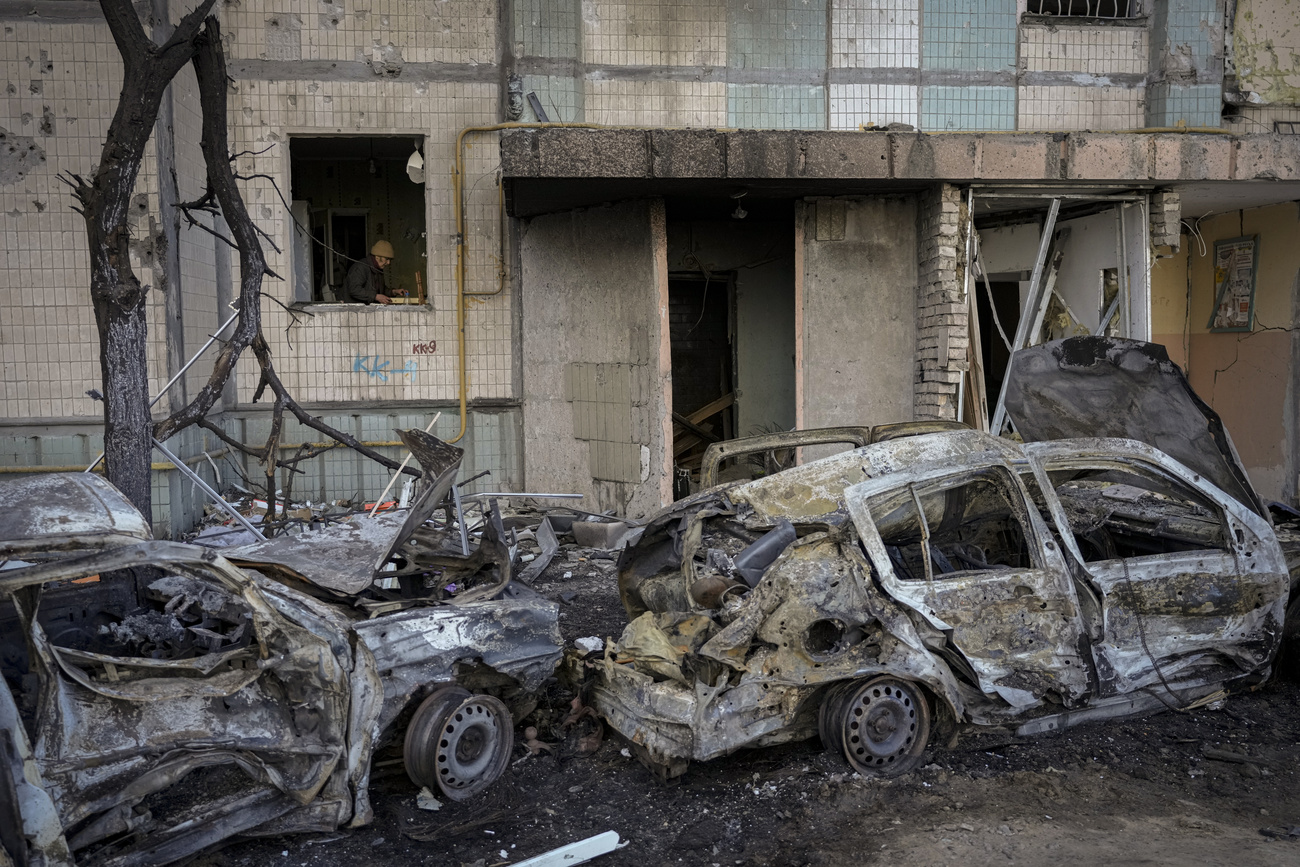
What are the Swiss doing to gather evidence of war crimes in Ukraine?

In March, Switzerland’s attorney general announced he was setting up a taskforce to collect evidence from refugees of possible war crimes in Ukraine. NGOs in Geneva are also working on this. We look at what they are doing and how they are coordinating.
“The idea is very simple,” Attorney General Stefan Blättler told SWI swissinfo.ch on April 29. “We cannot prosecute war crimes as long as the suspect is not in Switzerland. But on the other hand, we have a lot of refugees [from Ukraine], as do other European countries, and I’m sure that these people could have seen something or provide testimonies for potential war crimes trials. That is why we have to ensure that all this potential evidence is at our disposal.”
Switzerland does not currently have any suspects on its territory, Blättler says. But that does not mean it can’t happen or that trials won’t take place sometime in the future. If it has gathered evidence, Switzerland could share information with other countries if they open a Ukraine war crimes trial, or with the International Criminal Court (ICC) in The Hague.
ICC Prosecutor Karim Khan opened an investigation on UkraineExternal link following the Russian invasion, after a referral by 41 countries so far, including Switzerland. Ukraine’s prosecutor general has been gathering war crimes evidence since the start of the war, and, like Switzerland, many other national prosecutorsExternal link have set up special evidence-gathering units. The United Nations Human Rights Council in Geneva has also mandated an independent commission of inquiry.

More
Swiss prosecutor taskforce sets sights on Russian war crimes
‘Moral obligation’
Blättler took over as Attorney General on January 1 from Michel Lauber, who was eventually forced to resign amid allegations of misconduct in investigations of corruption at FIFA, world football’s Zurich-based governing body. Under Lauber the attorney general’s office was criticised for being slow on international war crimes cases, but Blättler says he wants to make them one of his priorities.
“As the nation where the Red Cross idea started, we have a special moral obligation to do something,” he told SWI swissinfo.ch. The Geneva-based International Committee of the Red Cross (ICRC) is the guardian of the Geneva Conventions, which aim, among other things, to protect civilians during war.
So how will the Swiss taskforce on Ukraine work? “I have charged my department responsible for war crimes and crimes against humanity to look at how we can get these potential testimonials. And we are looking for this information through police work and through the work of the State Secretariat for Migration,” Blättler said.
It is the police who will gather and conserve potential evidence from refugees. The attorney general’s office cannot do this itself unless a complaint is lodged against a suspect on Swiss territory, he explains, but it would then be able to access information from the police.
Blättler thinks it will take a little time for people to come forward. “A lot of people are traumatised and have other preoccupations right now than to give testimonies,” he said. “I’m convinced that it will take some time, but they will come, the police will speak to them, and then we will have something which can be released for the moment when a trial can start.”
NGOs already working
Many NGOS are also working on this, including in Switzerland. Gerry Simpson of Human Rights Watch Geneva has just returned from Ukraine. His organisation, headquartered in the US, is collecting evidence on the ground as well as through online sources. The NGO, which has longstanding experience of doing this, already had a member of staff in Ukraine when the Russian aggression began and now has a rotating team of about five people.
Initial interviews were mainly by telephone with people in places under attack, he said. “And then we went to the areas that were liberated and spoke face to face with people. That’s important, obviously, because it’s the most effective way of figuring out what happened – by going to the exact location, having witnesses walk you through what they saw in a given place.”
Human Rights Watch then matches witness testimonies with satellite imagery and material from social media through a dedicated technical team of five people. Its reports include, for example, one published on April 21External link which found that “Russian forces committed a litany of apparent war crimes during their occupation of Bucha”.
Swiss NGO TRIAL International, based in Geneva, offers another kind of expertise. Composed mainly of lawyers, it specialises in bringing cases under universal jurisdiction, a principle that allows countries to try international crimes – genocide, crimes against humanity and war crimes – committed anywhere in the world, regardless of the suspect’s nationality or place of residence.
Elsa Taquet, a lawyer at TRIAL working on Ukraine, says her organisation has mapped 166 countries that have adopted this principle in their national legislation, including 20 which – unlike Switzerland – do not require the suspect to be on their territory to start a case.
Bringing ‘value added’
With so many NGOs and international bodies working on evidence-gathering related to the Ukraine war, TRIAL has tried to define where it can bring “value added”, she told SWI swissinfo.ch, and has defined two areas: helping to build universal jurisdiction cases; and offering advice to the Ukrainian authorities for domestic trials because, she says, Ukraine should have priority over these cases if it is able and willing to prosecute them.
In order to carry out these two missions, TRIAL has partnered with other NGOs, including in Ukraine and neighbouring countries.
TRIAL thinks that cases in Ukraine and under universal jurisdiction can go faster in the immediate future, unlike international courts such as the ICC – although the ICC has acted with unprecedented speed on Ukraine so far – and this could have some kind of deterrent effect. On May 13 a Russian soldier appeared in court in KyivExternal link ahead of the first war crimes trial there.
Taquet says her organisation is concentrating firstly on “major events” in the Ukraine war. “These can include, for example, indiscriminate attacks using banned weapons such as cluster bombs, or attacks on hospitals and civilian buildings. Another criterion is large numbers of victims. That sounds terrible, but it facilitates research, because there will probably be the largest number of witnesses.”
International coordination
International cooperation is vital, according to Taquet, given the large number of actors gathering evidence in various ways.
Cooperating with international partners is also part of the Swiss taskforce on Ukraine’s work, Blättler says. “I am thinking of the International Criminal Court in The Hague, international organisations such as Eurojust and Europol, and other states,” he said. “And we have to exchange all information available with which a procedure could be started.”
Eurojust and Europol are both European Union organisations based in The Hague, promoting cross-border cooperation on crime. Switzerland is an associate member of both. While Europol focuses on police cooperation, Eurojust brings together national prosecutors on crimes falling under their mandate, including international crimes of genocide, crimes against humanity and war crimes. Eurojust recently set up a Joint Investigation Team on UkraineExternal link (JIT), comprising Ukraine, Poland, Lithuania and the ICC.
Switzerland is not part of this JIT but attends Eurojust meetings, including on Ukraine. “We also have delegates there,” Blättler says. “Let’s say it [Eurojust] is the daily stock market of information for judicial affairs. You meet the people from every participating state and you get your information on a day-to-day basis. That’s why Eurojust for us is a very important organisation.”
Eurojust President Ladislav Hamran also stresses the need for international coordination. “In the past, it was sometimes very difficult to find a state that was ready to find the financial and human resources to start war crimes investigations,” he said in an online briefing on March 30. “Today, with Ukraine, we have a very different situation. We may actually have more actors involved than we can manage.”
“The sheer number of investigative mechanisms in Ukraine places us all in the human rights community in uncharted territory,” says Simpson of Human Rights Watch. “We’re not used to this level of attention to violations of humanitarian law. We’ve been fighting for decades for this to happen all over the world, and we’re happy that it’s finally happened in at least one country. How all those mechanisms interact and coordinate to maximise their impact, identify and prosecute those responsible for abuse, that is a crucial question.”

In compliance with the JTI standards
More: SWI swissinfo.ch certified by the Journalism Trust Initiative




























You can find an overview of ongoing debates with our journalists here . Please join us!
If you want to start a conversation about a topic raised in this article or want to report factual errors, email us at english@swissinfo.ch.